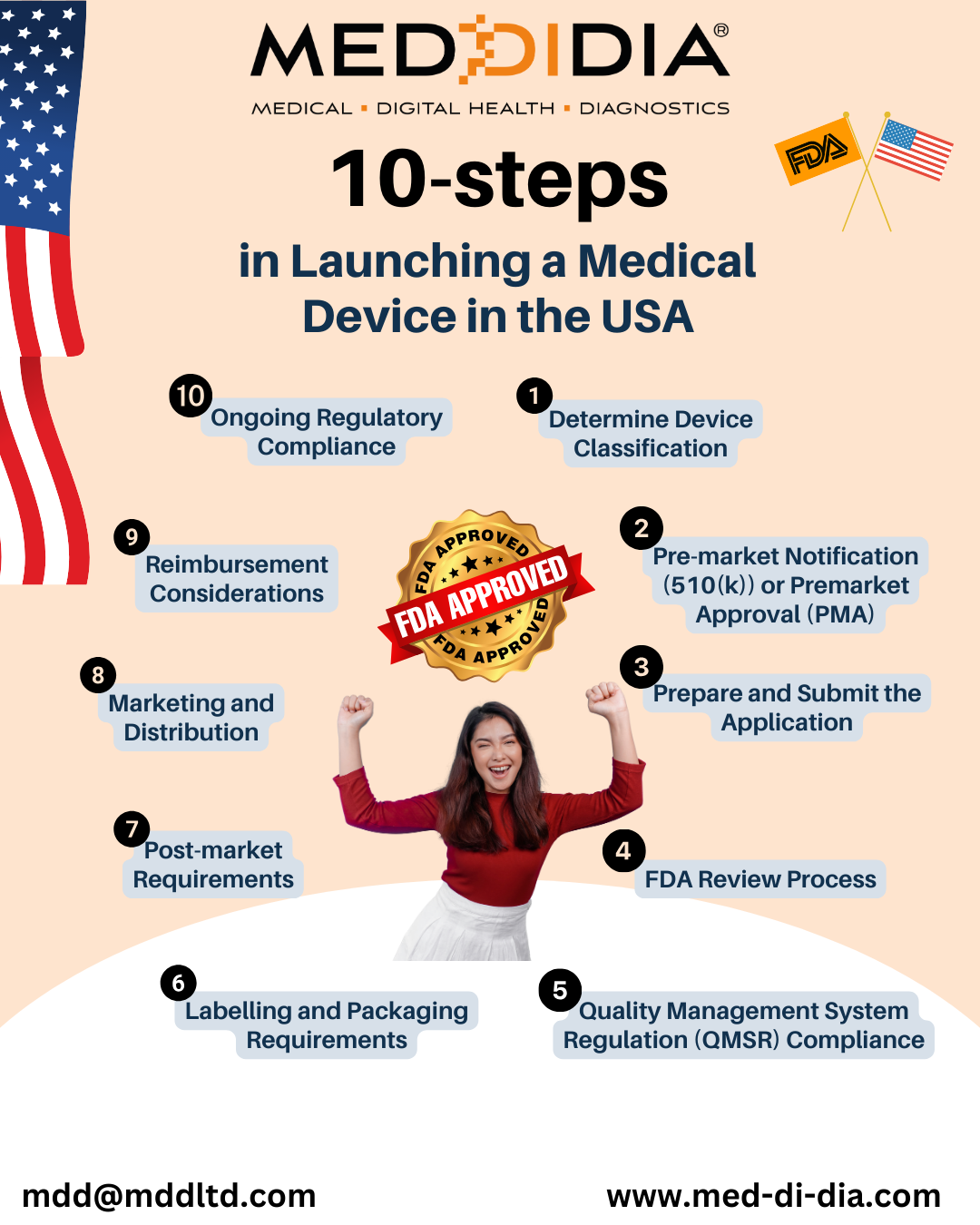Steps in Launching a Medical Device in the USA: A 10-step guide
Launching a medical device in the United States involves navigating a complex regulatory landscape designed to ensure safety and efficacy for patients. Whether you are a startup or an established company, understanding the process is crucial for a successful market entry. This blog aims to provide a detailed overview of the steps in bringing a medical device to market in the USA. Similar to the European market, US submissions begin with the classification of medical devices and continue in compliance with post-market clinical follow-up and ongoing compliance.
10-steps in Launching a Medical Device in the USA
- Step 1: Determine Device Classification
- Step 2: Pre-market Notification (510(k)) or Premarket Approval (PMA)
- Step 3: Prepare and Submit the Application
- Step 4: FDA Review Process
- Step 5: Quality Management System Regulation (QMSR) Compliance
- Step 6: Labelling and Packaging Requirements
- Step 7: Post-market Requirements
- Step 8: Marketing and Distribution
- Step 9: Reimbursement Considerations
- Step 10: Ongoing Regulatory Compliance
Let's explore these steps in detail and determine all the requirements for making a guaranteed submission to the US FDA.
Step 1: Determine Device Classification
The first critical step is determining the classification of your medical device according to the US Food and Drug Administration (FDA). Devices are classified into three categories (Class I, II, or III) based on risk and intended use:
- Class I: Low-risk devices such as tongue depressors and elastic bandages.
- Class II: Moderate-risk devices requiring special controls to ensure safety and effectiveness, such as powered wheelchairs or infusion pumps.
- Class III: High-risk devices that usually sustain or support life, are implanted, or present a potentially unreasonable risk of illness or injury, such as implantable pacemakers.
Step 2: Pre-market Notification (510(k)) or Premarket Approval (PMA)
Depending on the device classification, you'll choose between two pathways for FDA clearance:
- 510(k) Premarket Notification: This is required for most Class II devices and some Class I devices. This pathway demonstrates that the new device is substantially equivalent to a legally marketed predicate device that does not require premarket approval (PMA).
- Premarket Approval (PMA): Required for Class III devices and some Class II devices that are not substantially equivalent to a predicate device. PMA requires scientific evidence demonstrating the device’s safety and effectiveness.
Step 3: Prepare and Submit the Application
For a 510(k) submission, gather data showing substantial equivalence, including device description, labelling, performance testing, and applicable clinical data. For a PMA submission, compile comprehensive scientific data from clinical trials and studies and detailed manufacturing information.
Step 4: FDA Review Process
Once submitted, the FDA will review your application. For 510(k), the review process typically takes 3-12 months, while PMA reviews can take significantly longer (often more than a year) due to their complexity.
Step 5: Quality Management System Regulation (QMSR) Compliance
Regardless of the pathway chosen, compliance with the FDA's Quality System Regulation (QSR) under 21 CFR Part 820 is mandatory. QSR ensures that devices are designed, produced, and controlled in a manner that meets safety and effectiveness requirements.
On 31 January 2024, the United States Food and Drug Administrator [USFDA] published an update stating that the QSR—Quality System Regulation requiring CGMP will be replaced by the QMSR—Quality Management System Regulation, which harmonises with the global footstep. Under the QMSR, medical device manufacturers will have to transition their quality management systems to align with the ISO 13485 standard.
Step 6: Labelling and Packaging Requirements
Ensure that labelling meets FDA requirements, including device description, indications for use, warnings, and contraindications. Packaging should protect the device during shipping and storage and meet FDA standards for sterility, if applicable.
Step 7: Post-market Requirements
After FDA clearance or approval, adverse events are monitored and reported through the Medical Device Reporting (MDR) system. Compliance with post-market surveillance requirements ensures ongoing safety and efficacy monitoring.
Step 8: Marketing and Distribution
Once cleared or approved, you can market and distribute your device in the USA. Ensure compliance with advertising and promotional regulations set by the FDA to avoid misleading claims.
Step 9: Reimbursement Considerations
Consider seeking reimbursement from Medicare, Medicaid, and private insurance plans. Understanding reimbursement processes and codes (e.g., Healthcare Common Procedure Coding System, HCPCS) is crucial for market access.
Step 10: Ongoing Regulatory Compliance
Stay informed about regulatory updates and requirements. Regularly review and update your Quality Management System (QMS) to ensure ongoing compliance with FDA regulations and standards.
Where to Begin the Medical Device Launch Process
Embarking on the journey to launch a medical device in the USA can be daunting, given the intricate regulatory landscape and stringent requirements. The best place to start is by thoroughly understanding your device's regulatory classification and pathway. This initial step is crucial as it sets the stage for approval. To navigate these complexities efficiently and ensure that you are on the right track, consider approaching experts in the field. Consulting with specialists at Med-Di-Dia can provide invaluable insights and guidance tailored to your specific needs. Their expertise can help you accurately determine the device classification, choose the appropriate regulatory pathway, and streamline the submission process.
Reach out to our experts by sending an email to mdd@mddltd.com or by submitting a web form - https://med-di-dia.com/contact.php








